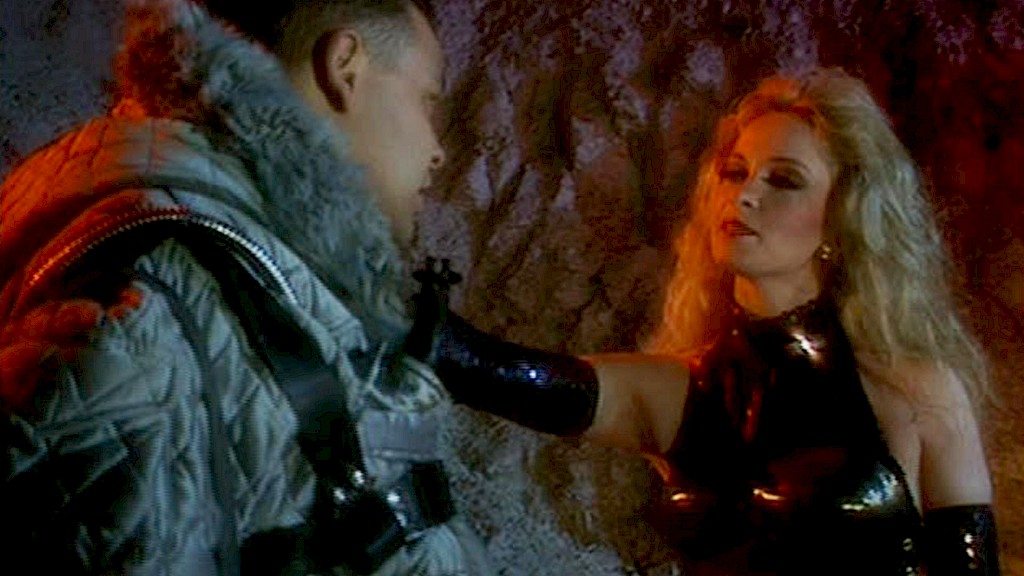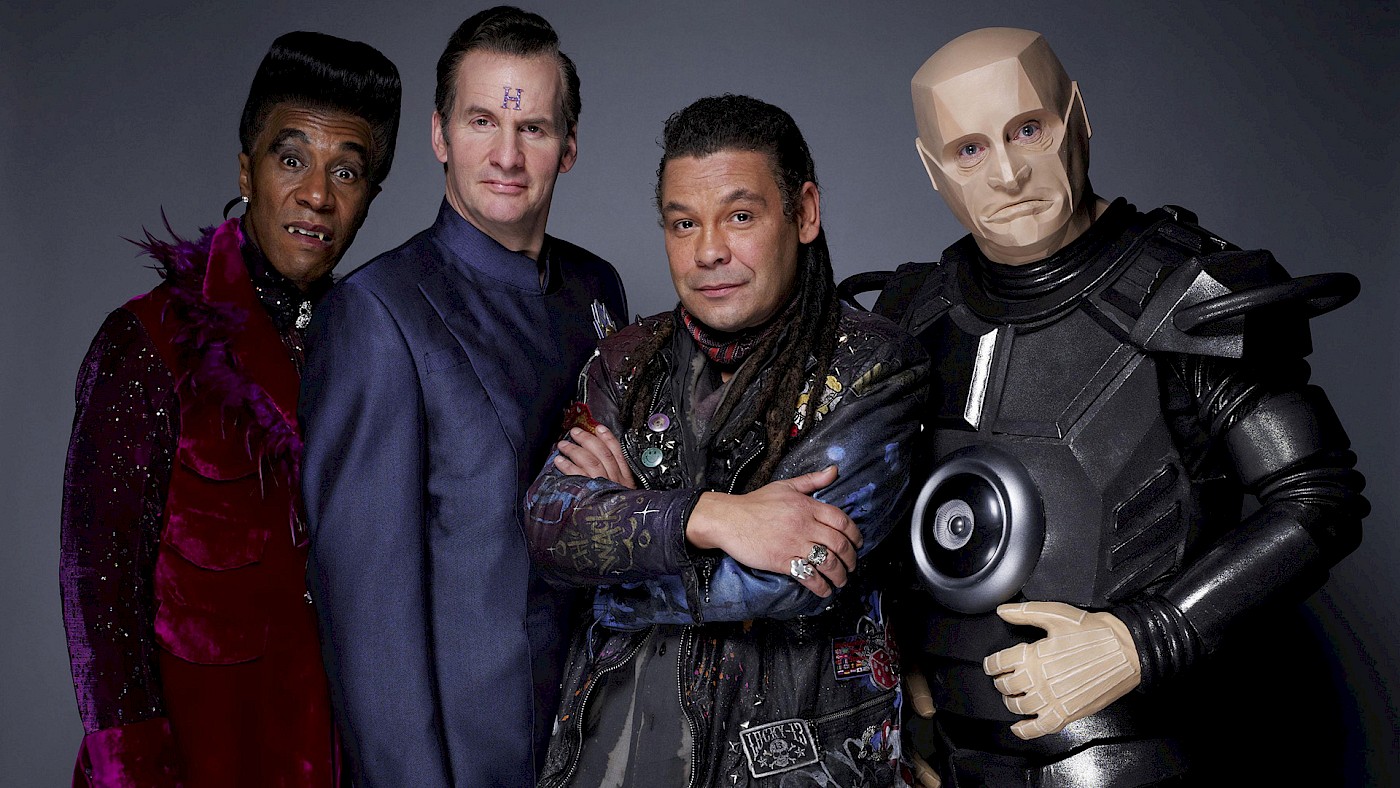The British science fiction sitcom Red Dwarf might seem at first glance an odd place to find references to ancient epic. Set on the mining ship Red Dwarf, stranded in deep space, the show revolves around the slobby third technician Dave Lister (played by Craig Charles), the last human being alive, who survives a radiation leak that wipes out the crew while he is in suspended animation.
Revived once the background radiation reaches safe levels after three million years, his only companions are a hologram of his dead bunkmate, second technician Arnold J. Rimmer (Chris Barrie), a creature evolved from his pet cat (Danny John-Jules), and the ship’s AI, Holly (initially portrayed by Norman Lovett, later by Hattie Hayridge). The crew is joined later by Kryten (Robert Llewellyn), a mechanoid with a malfunctioning guilt chip.
In the second episode of the fifth season, “The Inquisitor”, Lister is reading Vergil’s Aeneid – or rather, the comic book version. Kryten describes it with about as much historical knowledge as Holly shows when he said that “Plato invented the plate” (season 2, episode 6, “Parallel Universe”): “the epic tale of Agamemnon’s pursuit of Helen of Troy; the most classic work by the greatest Latin poet who ever put quill to parchment”, in Lister’s version the Greeks go about their slaughter with sound affects – kapow! Zap! Kersplatt!
Lister enjoys the story, but his assessment of the story is unforgiving of the Trojans, who bring the Wooden Horse into Troy: “People that stupid deserve to be kapowed, zapped, and kersplatted in their beds. From this particular phase of history we derive the phrase, ‘beware of Greeks bearing gifts.’ When it would be much more logical to derive the phrase ‘beware of Trojans; they’re complete smeg heads.’”
Dave’s odyssey
As Josho has written about in the past, there are plenty of science fiction stories that take ancient epic, particularly the Aeneid, as their inspiration. For Red Dwarf, however, I suspect these influences come at one remove. A different Odyssey inspired Rob Grant and Doug Naylor to include the scene above: Arthur C. Clarke and Stanley Kubrick’s 2001: A Space Odyssey.
In Clarke’s novelisation of 2001, astronaut Dave Bowman “began to read the Odyssey, which of all books spoke to him most vividly across the gulfs of time” (Arthur C. Clarke, 1998 [1968], 2001: A Space Odyssey (Orbit), p. 105). Bowman feels this resonance even before he loses all of his crew and is forced to complete his journey alone in the shattered raft of a spacecraft.
In Red Dwarf, numerous references are made to 2001. The ponderous theme tune of the first two seasons parodies the theme from the movie. The shipboard computer, Holly, was inspired by HAL 9000, the computer of 2001’s Discovery One (in season 2, episode 5, “Queeg”, Holly’s ‘death’ mimics that of HAL). The main characters share a name – Dave – and both, like Odysseus, are the last survivors of their crew.
Unlike Dave Bowman, Dave Lister seems completely unaware of his ancient predecessor. As far as we, the audience, can tell, he makes no connection between his own situation and that of the heroes from Troy (even after reading the Aeneid).
Nevertheless, there are more parallels between Lister and Odysseus. Both are arguably responsible for the deaths of their crew as Lister could have helped to repair the malfunctioning drive plate that caused the radiation leak. Odysseus is described as “god-like”; Lister is worshipped as a god by the species that evolved from his pet cat (season 1, episode 4, “Waiting for God”). Lister might not be able to fire an arrow through the heads of axes, but he plays pool with planets (season 4, episode 4, “White Hole”). And he worries, when he encounters the Inquisitor, that he is “nobody” – before eventually using trickery to escape a fate that would terrify a Homeric hero: erasure from history.
Psiren’s song
In the sixth season, the parallels with Odysseus become even more apparent. The eponymous mining ship has been stolen by hostile agents; the four-strong crew is relocated to the shuttle-craft Starbug as they try to find their way home to oust the invaders.
In the first episode of this season the crew attempts to head off Red Dwarf by travelling through an asteroid field. Here, they encounter a species of GELF (Genetically Engineered Life Form) which tempts unsuspecting humans in by altering their perception telepathically so that they can eat their brains: Psirens.

Lister makes the connection between these “Psirens” and the sirens of myth, referencing Ulysses (he’s read the Aeneid rather than the Odyssey). He does, however, think that the story is Turkish. The Cat even offers up something like a Homeric simile in the form of an “old cat proverb”: “There’s an old cat proverb – it’s better to live one hour as a tiger than a whole lifetime as a worm.” Unlike Odysseus the crew are seduced by these Psirens, and barely escape with their lives.
In the eighth season the crew, joined by a parallel universe version of Lister’s lost love Kristine Kochanski (Chloë Annett), return to Red Dwarf. They also encounter a computer so advanced that it can predict the future, aptly named “Cassandra” (season 8, episode 4, “Cassandra”). Besides the gift of prophecy there’s little to relate this Cassandra to her mythological counterpart – after their initial scepticism is abated, the crew believe what she tells them even when she lies.
Final thoughts
While some of these references are clearly intentional, the interplay between Red Dwarf and ancient epic is largely conjectural. While Rob Grant and Doug Naylor show casual familiarity with Greek myths such as the sirens and Cassandra, they clearly don’t know what the Aeneid is about. But as a working-class hero last man alive Dave Lister is a worthy successor to Odysseus, lost in space and trying to get home.
